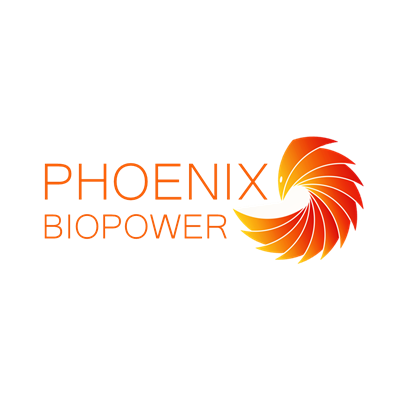JOINT STUDY WITH DRAX GROUP
Beteen 2021 and 2023 Phoenix BioPower together with Drax Group conducted a study investigating how new, energy efficient turbine technology can be incorporated into new build bioenergy with carbon capture and storage plants. The study will be based on results from two of Phoenix’ test facilities in Sweden and Germany
Fuel silos at Drax Group’s Sellby Plant.
Source: Drax Group
Phoenix BioPower and renewable energy company Drax Group have agreed to jointly carry out a feasibility study on energy-efficient gas turbines, which could be used in new-build bioenergy with carbon capture and storage (BECCS) projects to drive down costs.
The study aims to identify the commercial viability of new energy-efficient gas turbines, to power a potential 300MWe biomass plant with integrated carbon capture and storage (CCS) capability.
Drax is already the largest decarbonisation project in Europe having converted its power station near Selby in North Yorkshire to use sustainable biomass instead of coal. By deploying the vital negative emissions technology BECCS, Drax aims to go further, by becoming a carbon negative company by 2030.
Read more about Drax’ BECCS work here
Phoenix BioPower and Drax jointly studied:
Conducted a feasibility study to identify how Biomass-fired Top Cycle turbines can be integrated into new build CCS power stations.
Create a model based on data provided by both companies, based on results from two test sites in Sweden (biomass gasification) and Germany (ultra-wet gas turbine combustion) and will.
Investigated how gas turbines can also be utilised for other renewable technologies such as hydrogen combustion and production.
With this study, Phoenix BioPower joins the global leader in biopower and BECCS, Drax Group, in studying the BTC technology together with leading CCS technologies applied on a very large scale. At 300 MWe, the plant will be significantly larger that Sweden’s largest biopower plant when looking at both power generation and fuel capacity.
Henrik Bage, CEO of Phoenix Biopower said: “Working alongside Drax, a global leader in biopower and BECCS, gives us an exciting opportunity to explore the next generation of negative emissions technologies together with our high-efficiency biopower technology. We look forward to working with the world-class engineers at Drax on this study to further develop these essential technologies.”
Jason Shipstone, Drax Group Chief Innovation Officer, said: “Negative emissions technologies such as BECCS are crucial globally in the fight against the climate emergency. At Drax we’re already planning to install this vital technology at our existing power station in the UK in the coming decade.
“This partnership with Phoenix BioPower is part of our long-term innovation programme, which will enable Drax to understand the potential of future technological advances, so we can continue to innovate, develop and grow as a business.”
Process of Bio Energy CCS.
Source: Drax Group
About BECCS at Drax:
Drax aims to deploy BECCS on two of its biomass generating units by 2030 capturing and permanently storing up to eight million tonnes of CO2 a year – a significant proportion of the negative emissions the Climate Change Committee says are needed in order for the UK to reach its climate targets.
The IPCC, UK Climate Change Committee and National Grid’s Future Energy Scenarios report all recognise the vital role biomass and BECCS will play in the UK meeting its legally binding net zero by 2050 target.
The government’s legally binding commitment to cut emissions by 78% by 2035, in line with the CCC’s 6th carbon budget advice, also reinforces the vital role of BECCS to delivery net zero in the UK.
BECCS is the only negative emissions technology that generates power whilst also capturing and permanently storing carbon.
CCS, or Carbon Capture and Storage, is about capturing, compressing and storing carbon emissions. This can be done in many different ways, one being capturing CO2 emissions from flue gases of power plants. When combining CCS technologies with biopower, this is referred to BECCC, Bio Energy CCE, or Bio-CCS.
For more information on Drax and their BECCS work, please check out their website: www.drax.com.



